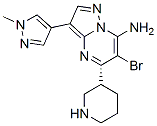All AbMole products are for research use only, cannot be used for human consumption.

SCH 900776 (MK-8776) is a novel and selective Chk1 inhibitor with IC50 of 3 nM. SCH900776 (300 nM) shows potent inhibitory activities against phosphorylation at ser296-Chk1. SCH900776 (1 μM) causes a 30-fold decrease in the IC50 for hydroxyurea in MDA-MB-231 cells. The Kd value of SCH 900776 for the CHK1 kinase domain is 2 nM. SCH 900776 exhibits an approximate EC50 of 60 nM in cells exposure to hydroxyurea. SCH 900776 induces dose-dependent suppression of CHK1 pS296 and concomitant accumulation of phospho-RPA signal in U2OS cells.
In vivo: SCH 900776 induces the γ-H2AX biomarker at 4 mg/kg (i.p.), and enhances tumor pharmacodynamic and regression responses in A2780 xenograft model. SCH 900776 (16 and 32 mg/kg, i.p.) induces incremental improvements in tumor response.
| Molecular Weight | 376.25 |
| Formula | C15H18BrN7 |
| CAS Number | 891494-63-6 |
| Solubility (25°C) | DMSO 3 mg/mL |
| Storage |
Powder -20°C 3 years ; 4°C 2 years In solvent -80°C 6 months ; -20°C 1 month |
| Related Checkpoint Products |
|---|
| PV-1019
PV-1019 (NSC 744039) is a potent, selective Chk2 inhibitor with an IC50 value of 24 nM. PV-1019 inhibits IR-induced apoptosis. |
| CCT241533 dihydrochloride
CCT241533 dihydrochloride is a potent and selective ATP competitive inhibitor of CHK2 with an IC50 of 3 nM and Ki of 1.16 nM. |
| CBP501 Affinity Peptide
CBP501 Affinity Peptide is a Chk kinase inhibitor that can abrogate G2 arrest induced by DNA-damaging agents. |
| Chktide
Chktide is a substrate for CHK1 and CHK2. |
| Zn-DPA-maytansinoid conjugate 1
Zn-DPA-maytansinoid conjugate 1 is a small molecule-based maytansinoid conjugate targeting immune checkpoint. |
All AbMole products are for research use only, cannot be used for human consumption or veterinary use. We do not provide products or services to individuals. Please comply with the intended use and do not use AbMole products for any other purpose.


Products are for research use only. Not for human use. We do not sell to patients.
© Copyright 2010-2024 AbMole BioScience. All Rights Reserved.
